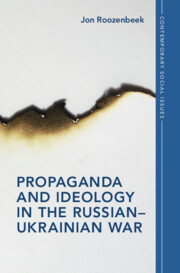Book contents
- Propaganda and Ideology in the Russian–Ukrainian War
- Contemporary Social Issues Series
- Propaganda and Ideology in the Russian–Ukrainian War
- Copyright page
- Contents
- Figures
- Maps
- Tables
- Acknowledgements
- Note on Transliteration
- Abbreviations
- Maps
- Introduction
- 1 A History of Russian–Ukrainian Relations
- 2 The Politics of the Donbas ‘Republics’
- 3 Building a Propaganda Machine
- 4 Newspaper Narratives in Occupied Ukraine
- 5 Identity and Ideology in Online Media
- 6 The Consequences of Propaganda
- Concluding Remarks
- Appendices
- References
- Index
Introduction
Published online by Cambridge University Press: 16 May 2024
- Propaganda and Ideology in the Russian–Ukrainian War
- Contemporary Social Issues Series
- Propaganda and Ideology in the Russian–Ukrainian War
- Copyright page
- Contents
- Figures
- Maps
- Tables
- Acknowledgements
- Note on Transliteration
- Abbreviations
- Maps
- Introduction
- 1 A History of Russian–Ukrainian Relations
- 2 The Politics of the Donbas ‘Republics’
- 3 Building a Propaganda Machine
- 4 Newspaper Narratives in Occupied Ukraine
- 5 Identity and Ideology in Online Media
- 6 The Consequences of Propaganda
- Concluding Remarks
- Appendices
- References
- Index
Summary
The Russian–Ukrainian War is one of the most important conflicts of the twenty-first century. Russia’s 2022 invasion was a failure in the military sense, but also in terms of propaganda. Despite a vast reservoir of ideological and historical referents to draw from, neither Russia nor the leadership of the Donbas ‘People’s Republics’ cared much for ideology. All attempts to build a collective identity (an ‘ingroup’) were short-lived, vocalised rarely and inconsistently on the pages of local newspapers and websites. Meanwhile, the outgroup, or the ‘they’ that opposes the ‘we’, was subject to a highly detailed and rich discursive construction. Internally (addressing the local population), this outgroup-focused discourse hearkened back to past conflicts, primarily World War II, and projected a sense of guilt on the part of Ukraine towards Donbas. Externally (addressing audiences outside the DNR and LNR, primarily Russian-speaking Ukrainians), this discourse ignored history altogether, and instead projected a sense of shame rather than guilt, seeking to discredit the Ukrainian government without reference to a shared connection that was lost.
- Type
- Chapter
- Information
- Publisher: Cambridge University PressPrint publication year: 2024

